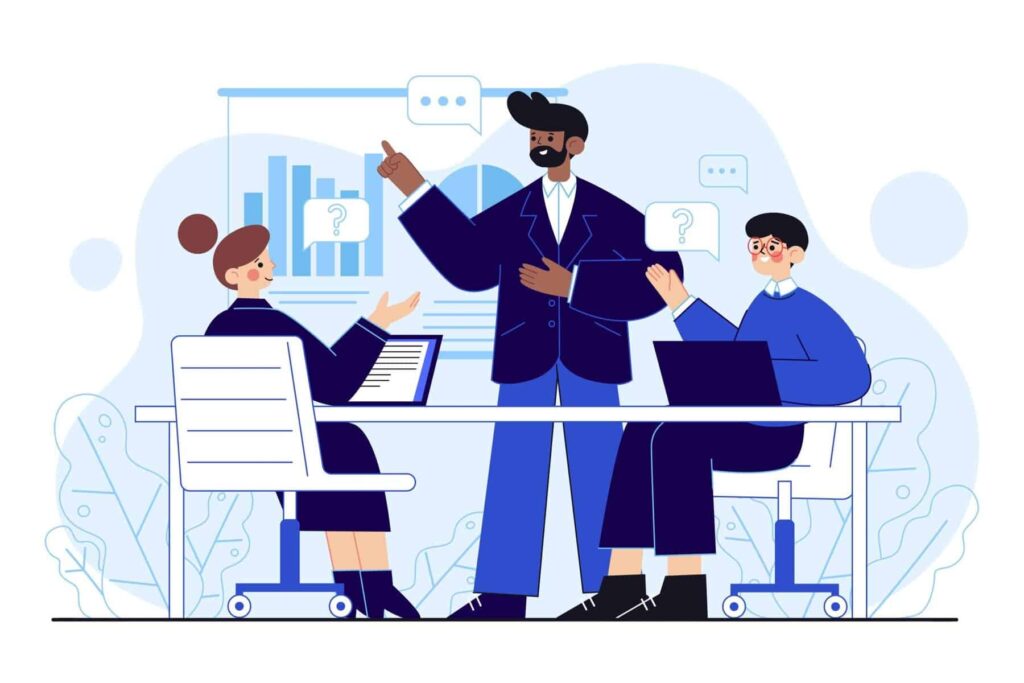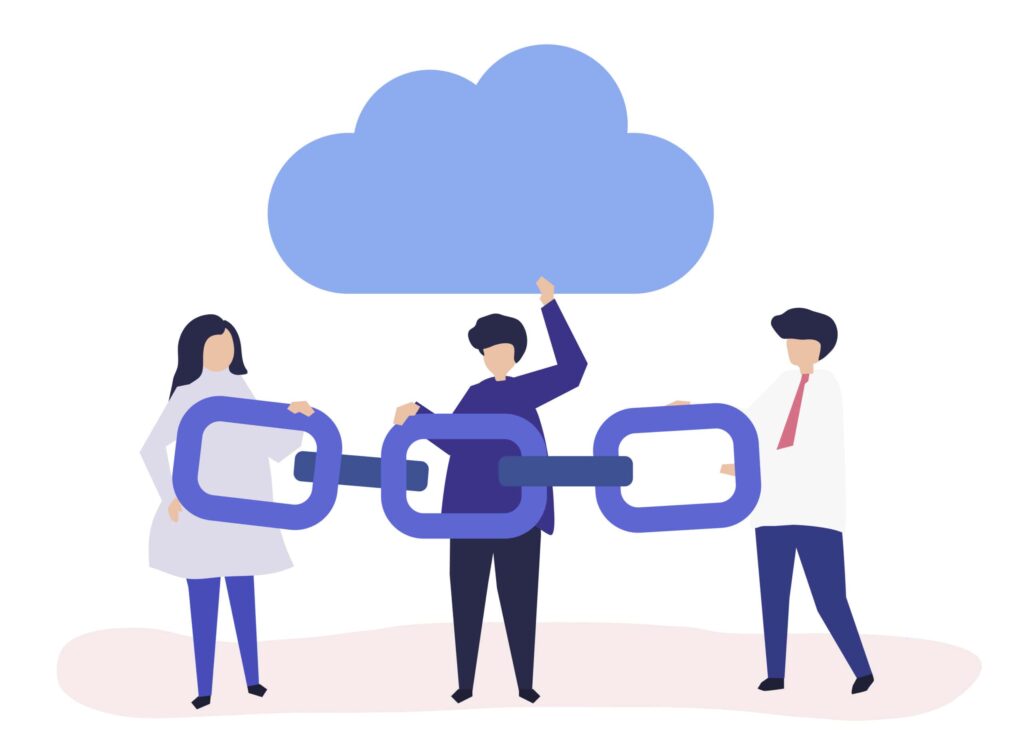Buying high-quality backlinks is one of the fastest ways to strengthen your domain authority, but in 2026, it’s also one of the riskiest. Google’s upgraded Link Spam systems and AI-driven quality scoring mean that buying links from the wrong places can damage your SEO instead of improving it.
Unfortunately, most backlink sellers today, including marketplaces, Fiverr gigs, and Upwork packages, rely on the same recycled websites sold to thousands of buyers. If you buy 20 links a month at $100 each, you’ve spent $24,000 a year… and a single algorithm update can make all of those links worthless.
So the real question isn’t whether you should buy backlinks — it’s how to buy them safely, strategically, and only from trusted sources.
This article will break down why brands consider buying backlinks, where not to buy them from, and the smartest way to invest in links that actually deliver long-term SEO results.
Why High-Quality Links Matter
High-quality backlinks serve as a vote of confidence for your website. However, the way Google evaluates them has evolved dramatically.
In 2026, the focus has shifted from domain ranking (DR), domain authority (DA), or vanity metrics to prioritizing context, authority, and real influence on user trust.
Here’s why high-quality backlinks matter more than ever:
AI search now decides visibility
Tools like Google’s AI Overviews and Perplexity heavily rely on sources they deem authoritative. These systems pull from sites with:
- Strong editorial credibility
- Relevant niche authority
- Consistent E-E-A-T signals
- Organic traffic and real readership
If your backlinks come from weak or irrelevant sources, AI systems simply won’t consider your website trustworthy enough to cite or rank.
Relevancy + traffic > DR
A relevant DR 30 website with 20K monthly traffic is more powerful than a DR 70 site with no traffic and no audience relevance. Google and AI models evaluate:
- Topical alignment
- Audience match
- Content quality of the referring page
- Natural placement
This is why cheap “DR 50+” marketplace links do nothing as they lack real influence.
E-E-A-T now drives rankings
Expertise, Experience, Authority, and Trustworthiness are now directly influenced by:
- Who links to you
- Why they link to you
- How naturally the link is placed
- Whether the publisher is reputable
High-quality editorial backlinks improve all four E-E-A-T pillars.
Penalty prevention
Google’s algorithms can identify link farms, guest post networks, PBNs, and paid placements disguised as “guest posts.” A handful of bad links can pull down your entire site or trigger a manual action. High-quality links protect you from this.
Google’s Stance on Paid Links
Google classifies all kinds of links bought for manipulating search algorithms as spammy links. This also includes links paid for in exchange for money or something else.
The search engine can (and will) penalize websites with unnatural link profiles, which is why link buying isn’t a sustainable practice in the long run. You should consider this:
- Link Schemes: Google penalizes links bought to artificially boost rankings, like those from PBNs or low-quality directories. Penalties include ranking drops or deindexing.
- Value vs. Manipulation: Buying links for advertising or exposure (e.g., sponsored posts) is acceptable if clearly labeled. Links meant to manipulate rankings without transparency violate guidelines.
- Risks: Google’s AI, including MUM and RankBrain 2.0, detects unnatural link patterns, like rapid link growth or over-optimized anchor text. Penalties can tank your rankings, and recovery takes months.
To stay safe, use “sponsored” or “nofollow” rel attributes for paid links and focus on editorial placements in high-quality content.
Do You Even Need to Buy Backlinks?
Not every business needs to buy backlinks, but in most competitive niches, organic link acquisition alone rarely moves the needle. If your competitors have been building authority for years, you won’t outrank them by publishing good content and hoping for the best.
Competitive niches require faster authority
Industries like SaaS, fintech, healthcare, cybersecurity, legal, and marketing move fast. The top-ranking sites usually have hundreds or thousands of referring domains, often built over several years.
A new SaaS tool publishing a “CRM software guide” won’t beat HubSpot or Salesforce without serious authority signals, no matter how good the content is.
Outreach is slow and often inefficient
Manual outreach sounds simple until you try it. Most teams face:
- 2–8% response rates
- Long publisher wait times
- Endless content revisions
- Unpredictable results
Brands often spend dozens of hours only to secure a handful of links, nowhere near the volume needed to compete.
DIY link building usually backfires
Most beginners unintentionally create a toxic link profile by:
- Choosing sites based on DR instead of relevance
- Falling for the same Fiverr/marketplace site lists
- Getting tricked into PBN placements
- Overpaying for low-quality posts
- Using irrelevant or spammy blogs
We’ve seen brands spend thousands on “DR 50+” guest posts that came from expired domains or AI-generated content farms.
Buying from trusted agencies saves time (and protects your seo)
A reputable agency already has:
- Vetted publishers
- Niche-relevant opportunities
- Real editorial relationships
- Proven white-hat processes
They handle everything from vetting to outreach, negotiation, content, and anchor optimization, giving you safe, scalable, and consistent authority growth.
Instead of gambling with cheap links, you get a structured system designed to improve rankings and withstand Google updates.
Where You Should Not Buy Backlinks
Some backlinks can actively hurt your SEO. Before you think about buying links, it’s important to know exactly where not to buy them from.
These sources often sell cheap, low-quality placements that trigger spam signals, waste money, and create long-term ranking issues.
1. Freelance platforms (Fiverr, Upwork, Legiit, etc.)
Freelancer platforms are filled with sellers offering “DR 50+ backlinks” for $10–$50, but these links almost always come from reused, irrelevant, or low-quality sites.
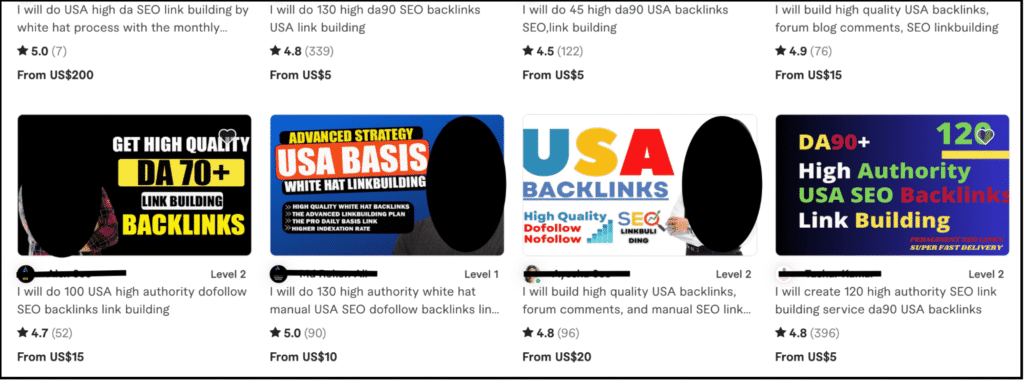
Most rely on footprints, expired domains, AI-written content farms, or link networks that Google has already flagged. While the prices look attractive, the long-term risk far outweighs the short-term gain, and many of these links end up harming authority instead of building it.
2. Backlink marketplaces (a costly, high-risk mistake)
Backlink marketplaces operate at scale, selling thousands of links from the same pool of websites to anyone who pays.
These sites often accept every topic, lack editorial standards, and have outbound link patterns that make them easy for Google to detect.
This is where businesses unknowingly burn the most money.
Here’s what a Reddit user has to say about their own experience with backlink marketplace:

Marketplaces offer volume, not quality, and that’s exactly why they’re dangerous.
3. PBNs and link farms
PBNs (Private Blog Networks) and link farms are designed to manipulate rankings with manufactured authority. They look legitimate at first glance, but Google can identify them through hosting footprints, identical templates, repetitive outbound links, and low-quality content.
Links from these networks may provide short-term traction, but they often lead to:
- Ranking drops
- Link spam penalties
- Loss of trust signals
- Sudden deindexing
Once your domain is associated with PBNs or link farms, recovering authority becomes significantly harder. In 2026, these tactics are simply not worth the risk.
Where You Should Buy Backlinks
In 2026, there’s only one sustainable answer: trusted, white-hat agencies.
Not because agencies are convenient, but because they are the only ones capable of delivering safe, relevant, editorial-quality links at scale.
Why agencies are the safest, smartest option
Buying backlinks from a reputable agency is a risk-management strategy. A strong agency provides what marketplaces and freelancers simply can’t:
- Access to vetted, real publishers
Agencies work with pre-vetted, high-quality publishers and not the recycled, low-authority sites found on marketplaces.
- Relevance over vanity metrics
Agencies prioritize relevance, real traffic, and E-E-A-T signals over superficial DR/DA numbers.
- Safe, white-hat processes
They use Google-compliant outreach methods, avoiding PBNs, link farms, and risky shortcut tactics.
- Scale, predictability & consistency
Agencies deliver consistent link velocity and controlled processes that freelancers and marketplaces simply can’t match.
- Saves time, money & future cleanup work
They prevent wasted spending and costly cleanup by building authority safely from the start.
Why Tanot Solutions is a trusted agency
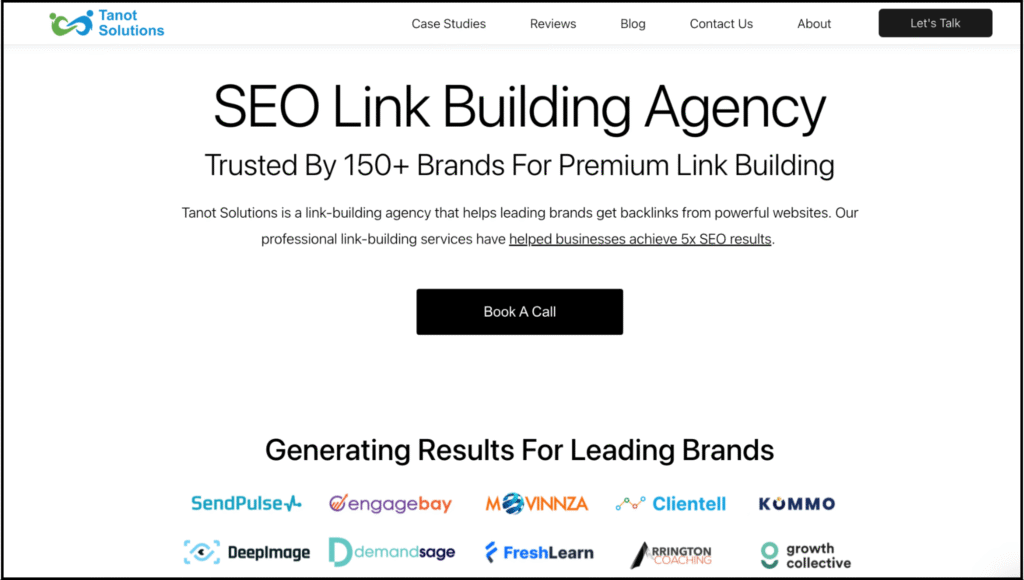
Tanot Solutions stands out because we go beyond “just building links.” We build authority systems tailored to each client’s SEO goals.
We combine white-hat outreach, strategic content placement, and rigorous publisher vetting to ensure every backlink contributes to sustainable, long-term growth.
Our approach is rooted in precision, transparency, and a deep understanding of how modern search algorithms evaluate trust and authority in 2026. You also get to pre-approve every site and placement before it goes live, giving you full control and complete visibility.

Whether you’re a B2B SaaS company in a crowded market or a fintech platform aiming to outrank established competitors, our clients consistently see measurable results.
They achieve faster ranking improvements, stronger keyword visibility, and steady, compounding organic traffic. This momentum translates into higher ROI every month.
Trusted by 150+ brands for premium, white-hat link building, here’s what our clients are saying:
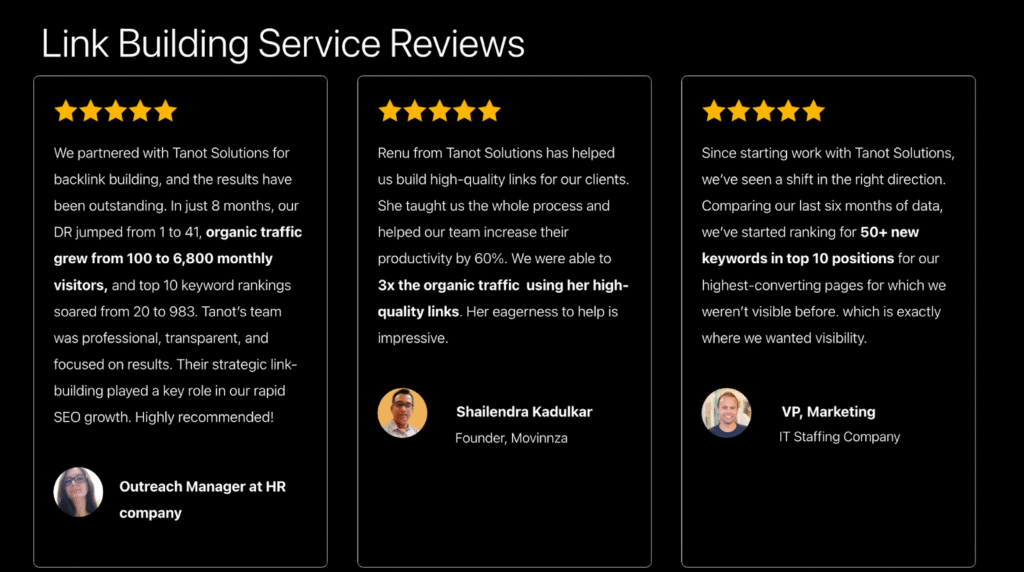
Cost Comparison: Cheap Links vs Trusted Agency Links
Investing in backlinks is about price, quality, and risk involved. This table highlights the true cost of cheap links compared to working with a trusted agency that focuses on sustainable ROI.
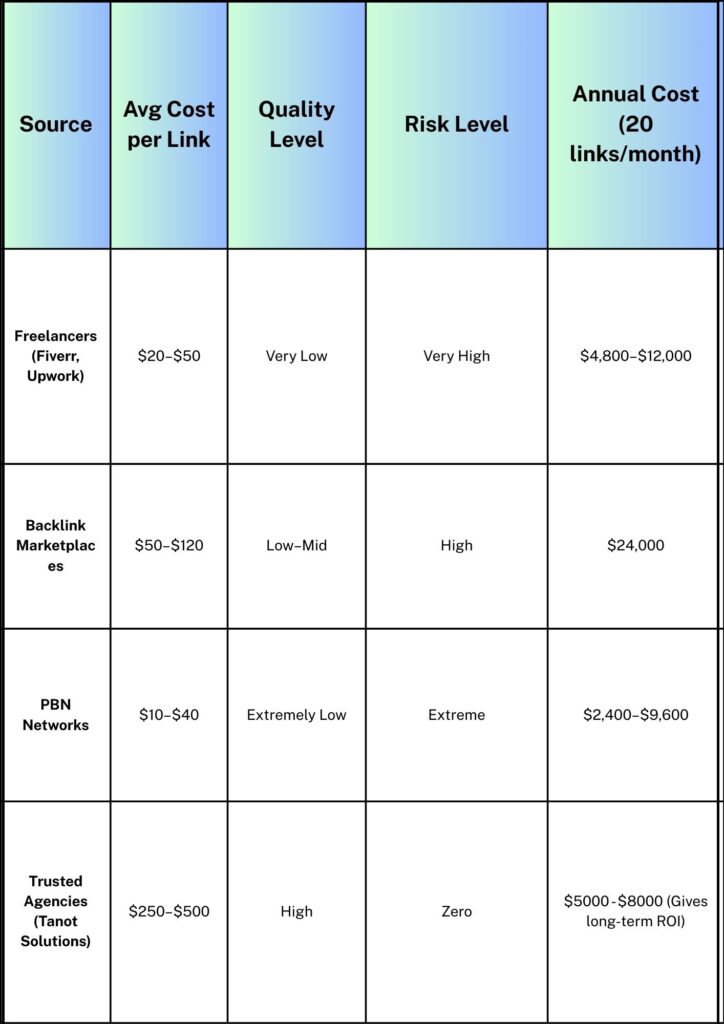
Frequently Asked Questions (FAQs)
How do I know if the backlinks I’m buying are safe?
Safe backlinks usually come from websites that have real traffic, real readers, and publish content related to your industry. Before buying, check if the site has recent posts, good-quality writing, and avoids linking to unrelated or spammy topics. If the website takes any topic or posts dozens of outbound links per article, it’s usually a bad sign. When in doubt, ask for sample sites and check their traffic and relevance before you approve anything.
Is buying backlinks illegal or against Google’s rules?
Buying backlinks isn’t illegal, but it does go against Google’s guidelines if they are obvious, low-quality, or part of a link scheme. The key is to buy links that look natural, are relevant to your niche, and come from real editorial websites. As long as the placement fits naturally into the content and the site is legitimate, the risk stays low.
What type of backlinks actually help rankings in 2026?
The backlinks that help the most are those placed on websites related to your industry and that get real visitors. Google values links from pages with helpful content, real editorial control, and a natural reason to reference your website. A single relevant link from a niche website will usually outperform 10 links from random high-DR blogs.
How many backlinks should a new website buy each month?
There’s no fixed number, but most newer websites see progress by adding 3–10 high-quality links per month. What matters more than quantity is consistency. Getting a few good links every month is better than buying 50 low-quality ones all at once, which can look unnatural and risky.
What’s the biggest mistake people make when buying backlinks?
The most common mistake is choosing links based on DR or DA instead of relevance and traffic. A lot of cheap backlinks come from sites that look strong on paper but have no real audience or are used by hundreds of other buyers. This leads to wasted money and possible penalties.
Should I choose backlinks based on price or quality?
Always choose quality. Cheap backlinks often come from networks, PBNs, or expired domains that Google can easily detect. Paying more for a link on a real, trusted website usually gives you better ranking power, more referral traffic, and fewer long-term problems.
Do I need to hire an agency to buy backlinks?
You don’t have to use an agency, but most people prefer it because agencies already have relationships with vetted websites. This saves time and reduces the risk of buying from low-quality sellers. If you do it yourself, be ready to research sites carefully, check their traffic, and make sure the link placement looks natural.


